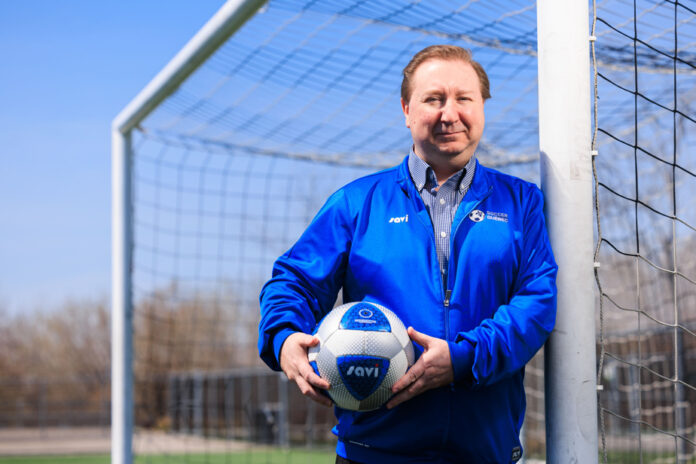Freshly arrived, the new general manager of Soccer Quebec, Olivier Plante, already has a lot on his plate. The good news is that he already knows the files and the angle with which he will attack them in the coming months.
Acting on an interim basis since March, following the departure of Mathieu Chamberland as chief operating officer at Canada Soccer, Olivier Plante officially took the reins of the Quebec sports federation with the largest number of members last Tuesday.
“I would never have thought a year and a half ago to find myself in this position. This is a very nice opportunity. I don’t come from the sports world, neither as an athlete nor as a manager, so I had impostor syndrome for a while. But there was a need here, as in several federations, to professionalize the management,” admitted Plante during an interview lasting more than forty minutes with La Presse.
The one who joined Soccer Quebec in 2021 as assistant general manager was also hired for these qualities. With more than 20 years in the professional world, Plante has made it his mission to “professionalize” the federation.
This managerial side, he already had it in his pocket. These are the workings of the world of soccer and the role of a GM that Chamberland has passed on to him over the past few months. He now feels more than ready to take over.
Plante intends to use his predecessor’s advice and lessons wisely to use the budget of just over $7 million a year to settle concrete issues.
From the outset, regarding the issue of security and that of violence, physical or mental, that athletes or officials may suffer, the DG launched that it will be “his little hobbyhorse”.
Without it being mentioned, we understand that the multiple controversies that have stained Canadian sports federations such as those of gymnastics and artistic swimming, but especially Hockey Canada, have worried Plante.
One of the ways the federation will move forward in this regard is by ensuring greater neutrality. After seeing the three employees of the discipline department – complaints, to be honest – leave, the association allowed itself some introspection.
For the rest of things, complaints will be handled by a body independent of the federation. A decision which is in line with professionalizing the association, according to Plante, and which will also avoid any appearance of conflict of interest.
An initiative of Canada Soccer, the launch of the Club Licensing Program had “a few hiccups,” Plante acknowledged.
In March, La Presse revealed a major legal tussle between Canada Soccer and Quebec clubs1 over the award of the program’s highest license, that of national recognition. While he notes that the pandemic did not help the introduction of the project, he adds that “all the stakeholders may have moved quickly in the implementation of this program.” “There are some things that we have to revise,” he conceded.
“It’s a program that is very structuring,” he noted. It comes to categorize clubs versus others. Clubs that have the national license will see their power to attract players from neighboring towns be enhanced. It’s mainly focused on competition, so it’s certain that athletes look at it before choosing their club.
“That aspect may have been undervalued, because some clubs were, let’s put it this way, emptied and it created discontent. We will try to limit these impacts. »
One aspect that has caused dissatisfaction among parents of players is that, according to Plante, “a few clubs may have taken advantage of this national license to raise their prices”. A facet that he acknowledges having to rectify in the coming months. Busy next few months.
In view of the 2023 season, registrations are going well for the Quebec federation. “We are ahead of 5%, even 10% in terms of registrations for this period compared to last year”, underlines Olivier Plante. Obviously, the successes of the national teams have something to do with it, according to him. With 125,000 registrations already, he suspects there will be more than last year’s 170,000 players. However, one of Plante’s other challenges will be to improve the retention of players, as well as officials and volunteers. “It starts with safe sport. Then, we have to make sure we respect our studies and put fun at the center of the game,” he concludes.















